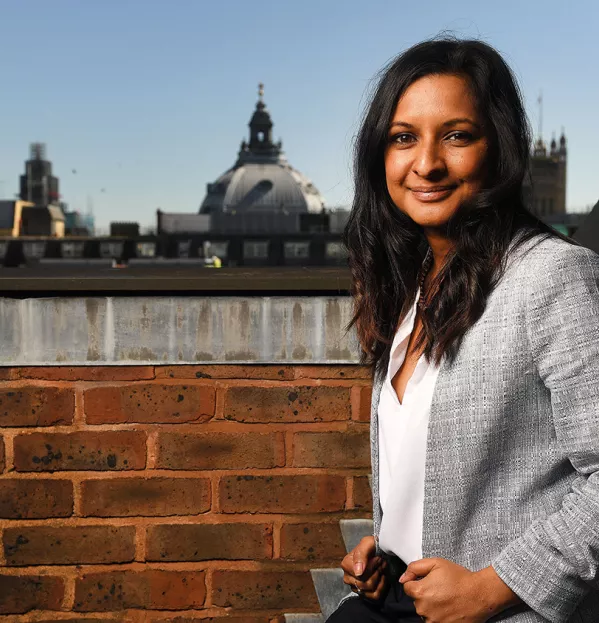‘Schools tell us they are buckling and I do not understand why the DfE is not listening’

Natalie Perera was denied a promotion at the Department for Education in 2015 because she “seemed overly distracted with fairness”. It was, she decided, time to move on.
Three years later, Perera is one of the driving forces behind an education thinktank that has put fairness at the heart of its work, and the reports of which are holding sway in the corridors of power she once walked.
As executive director and head of research at the Education Policy Institute (EPI), she has been behind work that has examined the fairness of Ofsted judgements, questioned the effect of grammar schools on social mobility, and highlighted barriers to mental healthcare for children.
Despite being in its infancy, the EPI was last year named thinktank of the year at the Public Affairs Awards, and it is about to swap its poky attic office in Westminster for more spacious premises opposite Victoria train station.
Much of Perera’s commitment to educational equity can be traced back to her own schooling. The daughter of first-generation immigrants who worked shifts in the NHS, she did not go to university and had no experience of navigating the English education system. She feels that “the system let me down at various points”.
Bad advice
Perera is critical of the careers advice she was offered, in particular, which consisted of a single session during Year 10.
“A lady came in and made us do a multiple-choice questionnaire,” she recalls. “I did mine and she came and spoke to me for about three minutes and told me that the data said I ought to be a probation officer.
“I said, ‘I don’t really want to do that; I want to be a teacher or a journalist,’ and she said, ‘No, no, no, it says here that you ought to be a probation officer, so that’s what you ought to do.’”
Perera applied for university places and was given interviews, but the lack of support available to her meant “I literally did not know how I would go to university: who would pay for it, where I would live, how I would travel.”

Knowing that her parents would not be able to support her financially, she decided to take a year out “and never went back”.
Although she does not feel disadvantaged by her lack of a degree, Perera “regrets slightly” missing out on the student experience. Instead, the DfE, which she joined aged 20, was “almost like my university”.
She began in the private office of Margaret Hodge, a minister of state, doing diary and admin work, but started going through policy papers and attending ministerial meetings.
“I really enjoyed working for her because she was probably one of the first experiences I had of a strong, successful woman,” says Perera. “She put her confidence in me and I think that enabled me to grow in confidence.”
It is that confidence, combined with the discovery of an unexpected passion for numbers when working on the 2010 spending review, that led to her heading up the DfE’s work to reform school funding during the coalition government’s tenure. Looking back, she describes it as “the best job I ever had”.
The complex and politically contentious reforms involved not just planning to introduce a national funding formula (NFF) for schools, but also the new pupil premium, universal infant free school meals funding, and academy funding. It was in this role that she met a kindred spirit in David Laws, the analytical Liberal Democrat MP, who became schools minister in 2012.
When he was appointed, Perera prepared a detailed PowerPoint presentation to talk the new minister “very slowly, very carefully” through such a complicated issue.
“We got to his room in Sanctuary Buildings, sat down, prepared to go through it with him, and he said ‘Right, shall I tell you what I think the problem is?’ He talked me through my presentation,” she laughs. “That added to my enjoyment of working on school funding, working with a minister who was very engaged, passionate and approachable.”
But despite years of work on it, the NFF was deemed politically toxic and put back in the too difficult box. In his memoirs, Laws says that David Cameron, who was prime minister at the time, described it as “Michael [Gove]’s plan to lose me the next election”.
“We could totally understand by the time it got inside Number 10 that there was no appetite from Cameron, or even Clegg, to do it,” Perera says, “but it was pretty heartbreaking because we had worked on it and we knew it was the right thing to do.”
Last year, Justine Greening succeeded in finally introducing a NFF - something for which Perera believes the former education secretary is not given enough credit, especially as this version is “reasonably progressive” with a strong weighting for disadvantaged pupils.
Government in denial
Funding remains an acute challenge for schools today, and a key focus of the EPI’s work. Last month, it found that the proportion of maintained secondary schools with deficits had almost trebled in the four years leading up to 2016-17, and the fact that the DfE seems to be in denial about it baffles Perera.
“What we do know is that there are a large number of schools out there that tell us they are buckling under the funding pressure, and I do not understand why the government is not listening to them,” she says.
“The narrative is that we trust teachers, we trust leaders, we want them to be autonomous, we want to devolve power to schools, yet on funding, when they tell us that they are falling down, the government’s saying, ‘Oh, you’ve got more money than ever - deal with it.’”
She believes the DfE simply can’t publicly acknowledge the problem. “They are probably using all of our reports, stuff the IFS [Institute for Fiscal Studies] has put out, and going to the Treasury and saying ‘Look, we are in a bit of a sticky situation here’, but publicly, they can’t say that. It’s political suicide.”
Is it inevitable, then, that the funding squeeze will hit educational standards? “I think it’s going to be really difficult,” she answers, saying that the most disadvantaged pupils will be worst affected.
“It’s the things that enable education to happen that will suffer: the pastoral care, the after-school clubs. There is enough money in the system, I’m sure, to put 30 children in a class in front of a teacher, but if you have children there with additional needs, EAL [English as an additional language], mental health needs, kids who are hungry, then just sitting them down in a classroom in front of a teacher ain’t going to fix that.”
‘We’re not ideological’
Perera says that, after 13 years in the civil service, she knew it was time to leave the DfE when she was rejected for the promotion for which she applied after the 2015 election.
“The feedback I got, and I think it was justifiable, was ‘you clearly understood the policy area, but we were worried because you seemed overly distracted with fairness and talking to ministers about what is fair’,” she recalls.
“Obviously, when you are a civil servant, you have to be impartial, you have to be objective, and you have to give a very balanced view. And I realised then that, actually, I care too much about what is fair to be here right now, and probably it’s time to move on.”
Perera jumped ship not because of there being a Conservative government, she says, but because academies and free schools were trumping issues that mattered most to her, such as early years and social mobility.
David Laws was also on the move, having lost his parliamentary seat in 2015. The former schools minister became head of what was then known as the CentreForum thinktank and suggested that Perera apply for the role of its executive director.
The organisation was undergoing a transformation, as it narrowed its focus to education, and re-emerged as the Education Policy Institute the following year.
“The real turning point was when we took a very proactive decision that our work would be data- and evidence-driven, and largely led by quantitative research,” says Perera.
“We pitched this idea to the chair of trustees and he said, ‘Oh, so like the IFS of the education world,’ and that was the lightbulb moment - that’s exactly it. We want to do for education what the IFS is doing for fiscal policy.”
Although CentreForum was sometimes seen as a Lib Dem thinktank, she is adamant that the EPI is “not on a political spectrum”, despite the prominent former Lib Dem MP at its helm. “We are not ideological,” she says, “but we have a strong moral purpose.
“We want educational opportunity and excellence for everybody, but particularly for the most disadvantaged.”
You need a Tes subscription to read this article
Subscribe now to read this article and get other subscriber-only content:
- Unlimited access to all Tes magazine content
- Exclusive subscriber-only stories
- Award-winning email newsletters
Already a subscriber? Log in
You need a subscription to read this article
Subscribe now to read this article and get other subscriber-only content, including:
- Unlimited access to all Tes magazine content
- Exclusive subscriber-only stories
- Award-winning email newsletters